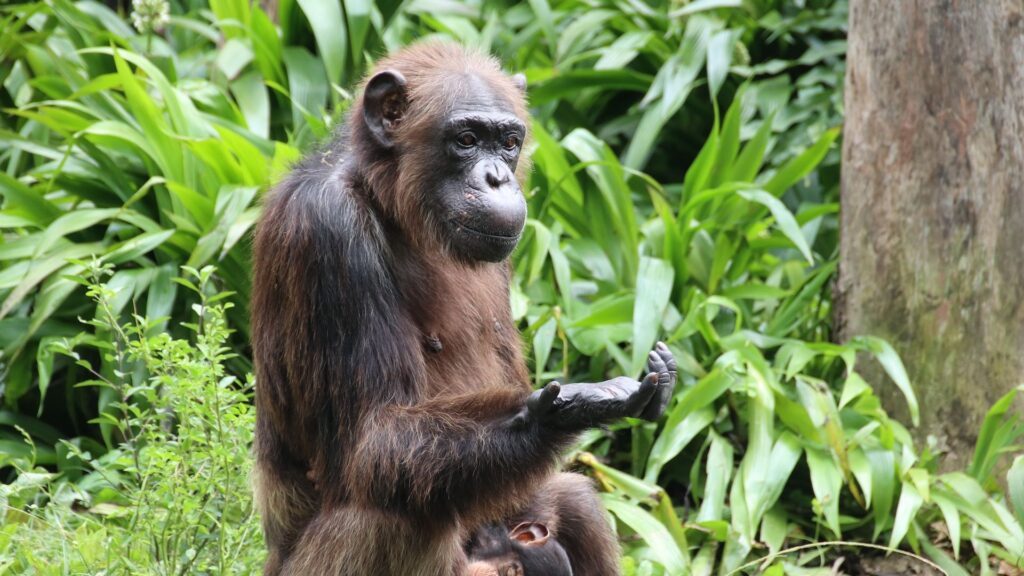Chimpanzees use a variant of the “scientific method,” allowing them to abandon their previous beliefs and change their minds when compelling new evidence emerges, according to a new study.
When chimpanzees (Pan troglodytes) were given the task of finding a tasty treat hidden in one of two boxes, they evaluated several pieces of evidence. And when new and contradictory evidence emerged, they switched their choices, the study found.
you may like
“When they revise their beliefs, they are actually articulating the evidence they have and weighing different types of evidence,” study co-author Jan Engelman, a comparative psychologist at the University of California, Berkeley, told Live Science.
Humans routinely use metacognition to weigh different pieces of evidence and create plans based on available information. Also, update your strategy if things don’t go as planned.
Scientists have long known that primate species can evaluate evidence. Chimpanzees follow crumb trails to find food, but they also look for further information when existing evidence is unclear. But we didn’t know whether chimpanzees could perform the important metacognitive task of changing beliefs in response to new evidence. Engelman’s team used several behavioral tests to answer this question, all of which involved a food reward placed in one of two boxes. In the first two experiments, chimpanzees were trained to choose one of the boxes to receive food inside and were presented with two contradictory pieces of evidence about which box contained food. The chimpanzee was presented with one piece of evidence, selected a box, then given another piece of evidence and allowed to select again.
The strength of the evidence varied. For one “strong” evidence condition, the researchers cut a window into one side of the box so the chimpanzees could see the food inside. To provide “weak” evidence, the researchers shook the other box to show there was something inside. The apes were much more likely to change their minds if researchers presented them with strong evidence after their initial choice than if they presented weak evidence.
However, these results did not tell the researchers why the chimpanzees changed their minds.
“You can revise your beliefs without really thinking about the evidence,” Engelman said.
The researchers designed a third experiment in which chimpanzees were shown three boxes. One box had strong evidence that it contained food, the second had weak evidence, and the third had nothing. Before they could make their selection, the “box of strong evidence” was removed. When faced with a binary choice, apes consistently chose weaker evidence over no evidence at all. This shows that chimpanzees consider both strong and weak evidence in their decision-making, rather than only considering strong evidence without considering other available options, Engelman said.
you may like
In the final experiment, the researchers tested two more metacognitive abilities in the great apes. Now, after presenting weak and strong evidence for two boxes, the researchers have presented another weak piece of evidence. This was either the same weak evidence as before, that the researchers rattled the box to indicate something was inside, or new evidence, the sound of the researchers dropping a second piece of food into the box.
Apes are more likely to change their mind and select that box when they hear two different pieces of evidence than they are when they hear the same piece of evidence twice, indicating that they consider ways to combine different pieces of evidence to strengthen their arguments.
In the final test, the researchers again added additional evidence to consider after the apes made their initial choices. This time, new evidence overrode the original evidence. For example, you could show a chimpanzee a pebble in a box, and the pebble might make a rattling sound that it had heard before. Apes consistently responded to this contradictory evidence by changing their minds.
For Casal Omadagain, a cognitive scientist at Morocco’s Mohamed VI University of Technology who was not involved in the study, this last experiment was key to proving the metacognitive abilities of great apes. “Study 5 shows some kind of rationality that was not shown in studies 1 and 2,” he told Live Science. Experiment 5 showed that contradictory evidence was associated with the original evidence, and the apes’ changes of mind reflected that they were “tracking” the original information, he added.
Omadagain said this paper, along with other early studies of chimpanzee rationality, shows that chimpanzees make choices based on evidence and keep that evidence in mind as the world changes, overcoming what he called the “high bar” of rationality. This new finding suggests that discoveries about the minds of other animals are limited not by those animals’ shortcomings, but by humans’ own, Omadagain said. “The biggest constraint on understanding the intelligence of other animals is our ability to come up with appropriate ways to check it.”
Engelman and his team now plan to extend the experiment to non-human primates to see if they can pass this rationality test.
Source link

